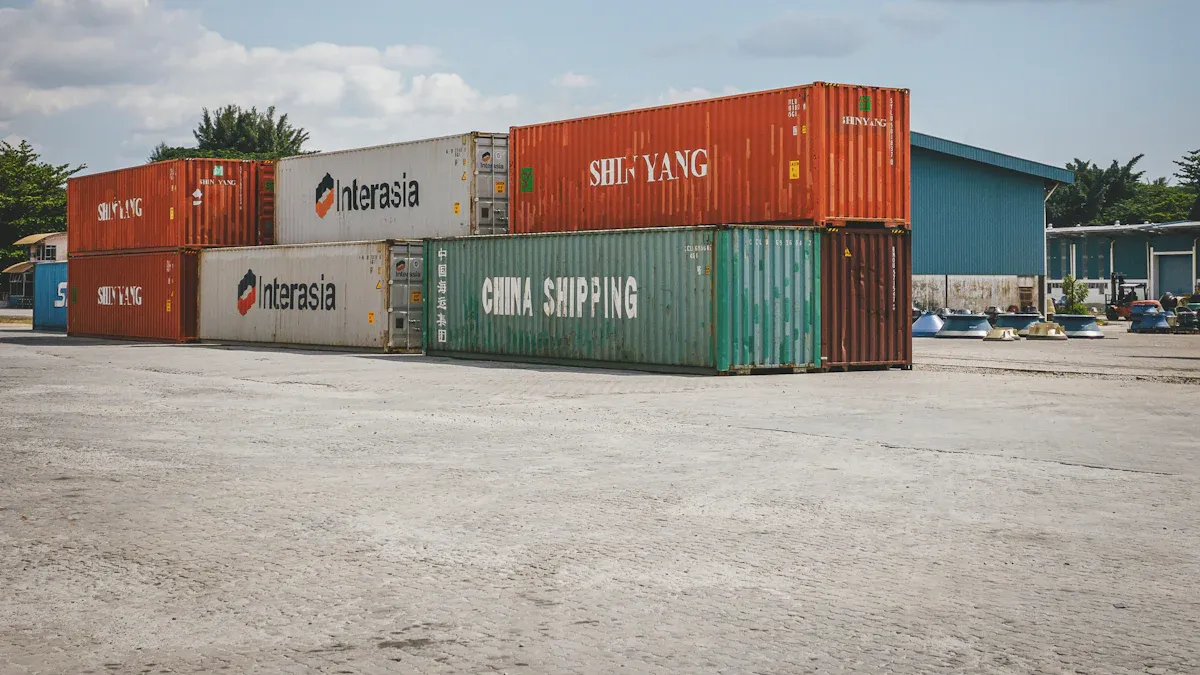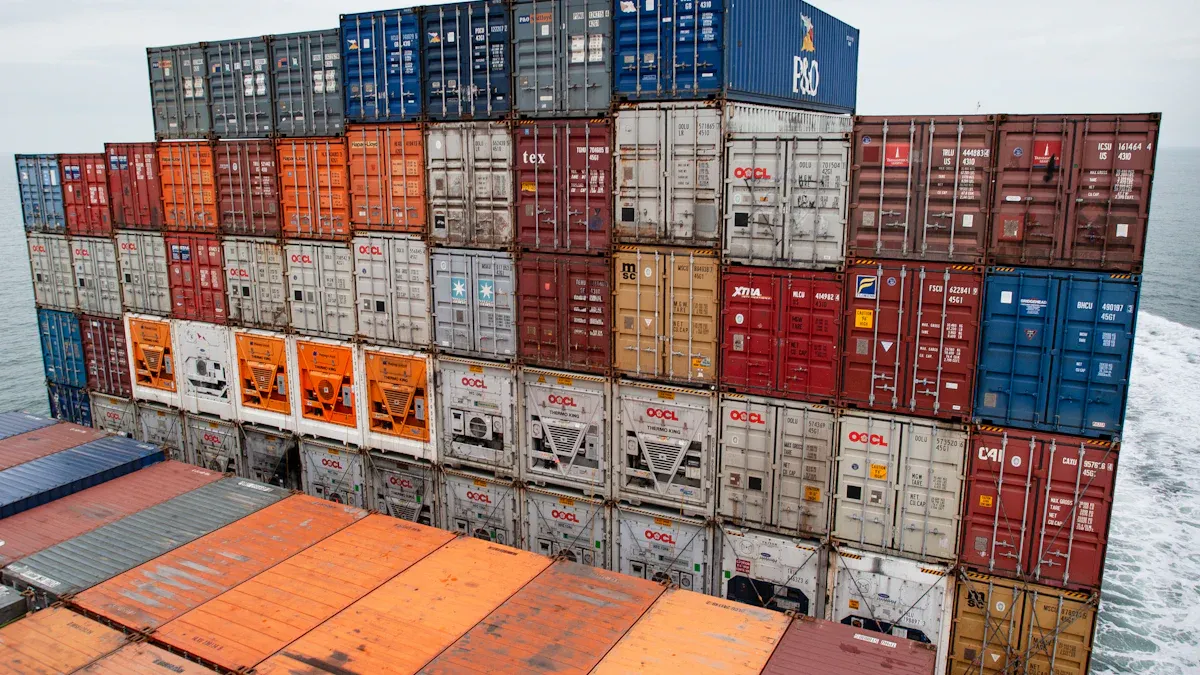How to Leverage Bulk Purchasing from China for High-Profit Margins

Bulk purchasing from China offers unmatched opportunities for businesses to maximize profits. With affordable pricing, a wide supplier base, and advanced scaling capabilities, you can reduce costs and meet market demands efficiently. By sourcing directly from manufacturers, you eliminate middlemen, ensuring lower expenses and faster delivery—ideal for e-commerce and selling products online.
Tip: Importing from China becomes even more profitable when you negotiate bulk discounts. For example, buying 20,000+ pairs of shoes can save 5.6% per unit compared to smaller orders.
Key Takeaways
Buying in bulk from China can cut costs and boost profits. Ask for discounts on big orders to save more money.
Build good relationships with suppliers to get quality products. Talking often builds trust and may get you better deals.
Research products and suppliers carefully. Check if they are real and choose popular items to make your business stronger.
Benefits of Bulk Purchasing from China

Cost Savings and Economies of Scale
Bulk ordering from China allows you to significantly reduce costs by leveraging economies of scale. Manufacturers in regions like the Pearl River Delta specialize in large-scale production, which lowers component costs through dense supplier networks. Additionally, China's advanced logistics infrastructure, including ports like Shanghai and Shenzhen, ensures efficient transportation, reducing shipping costs and delivery times.
You also benefit from China's high labor productivity, especially in industries like electronics, where productivity is 1.8 times higher than in Vietnam. This efficiency translates into lower production costs, enabling you to maximize profit margins. By placing bulk orders, you can negotiate better pricing and secure discounts that further enhance your cost savings.
Tip: Consolidate your orders to take full advantage of reduced per-unit costs and streamlined shipping processes.
Access to Diverse Products and Raw Materials
When you buy raw materials from China, you gain access to an extensive range of resources and products. China is a leading supplier of rare earth metals essential for high-tech industries, as well as traditional minerals like coal and iron ore for industrial applications. This diversity allows you to cater to various market demands and expand your product offerings.
Benefit Type | Description |
|---|---|
Affordability | Access to products at reasonable costs due to rising productivity and automation. |
Wide Supplier Base | Diverse options available through sourcing agents who understand local conditions and trends. |
Risk Reduction | Strict quality control measures in China reduce risks associated with fraud and quality issues. |
Advanced Scaling | Ability to quickly scale production based on demand, benefiting small businesses and startups. |
Sustainability | Growing demand for ethically made goods aligns with sustainable practices in Chinese manufacturing. |
Direct Sourcing | Eliminates middlemen, reducing costs and delays in the supply chain. |
By sourcing raw materials from China, you can meet the needs of industries ranging from e-commerce to manufacturing, ensuring your business remains competitive.
Scalability for Business Growth
Bulk purchasing from China supports scalability, making it easier for your business to grow. Chinese suppliers excel at managing orders of any size, from small batches to large bulk orders. Their efficient supply chains and abundant labor resources help reduce manufacturing costs, allowing you to scale production without compromising quality.
The wholesale market in China offers a vast selection of products, enabling you to adapt quickly to changing consumer demands. Whether you're importing from China for a startup or an established business, the ability to scale operations ensures you stay ahead in competitive markets.
Note: Partner with suppliers who can handle increasing order volumes to avoid disruptions as your business expands.
Finding the Right Products and Suppliers
Identifying High-Profit Margin Products
To achieve higher profit margins when buying from China, you must carefully select the right products. Start by conducting thorough market research to identify items with high demand and competitive pricing. Focus on your niche and develop a detailed sourcing strategy that aligns with your business goals. Researching legal standards and import regulations is equally important to avoid fines or delays during customs clearance.
Understanding China's economic landscape can also help you optimize sourcing locations. For instance, regions like Guangdong specialize in electronics, while Zhejiang is known for textiles. Building relationships with trustworthy suppliers allows you to negotiate better deals, ensuring your products remain cost-effective and profitable.
Tip: Use tools like Google Trends or Amazon Best Sellers to analyze market trends and identify products with strong sales potential.
Conducting Supplier Research and Due Diligence
Finding trustworthy suppliers is crucial when sourcing raw materials or finished goods. Begin with preliminary research to verify a supplier’s credibility. Check their official website for details about their offerings and history. Social media platforms like LinkedIn can provide additional insights into their reputation.
Reputable business directories such as Alibaba and Global Sources are excellent platforms for identifying reliable suppliers. These directories often include reviews and ratings, helping you assess the supplier’s reliability. Always request references or certifications to confirm their legitimacy before placing bulk orders.
Building Strong Supplier Relationships
Establishing strong relationships with suppliers is essential for long-term success when importing from China. Regular communication fosters mutual trust and ensures both parties stay aligned on project goals. In Chinese business culture, personal relationships (guanxi) play a significant role. Investing time in building these connections can lead to better pricing and priority service.
Clearly outline your expectations regarding quality and delivery timelines to avoid misunderstandings. Engage in activities outside of business, such as attending trade fairs or supplier-hosted events, to strengthen your partnership. A solid relationship with your supplier can provide competitive advantages like faster delivery, reduced costs, and a secure supply chain.
Note: Effective supplier management not only improves your sourcing process but also enhances your ability to scale operations efficiently.
Managing Risks and Ensuring Quality
Importance of Sampling and Quality Control
Ensuring product quality is critical when bulk ordering from China. Sampling and quality control measures help you avoid costly mistakes and maintain customer satisfaction. Before committing to large orders, request product samples to evaluate quality firsthand. This step allows you to identify potential issues early and communicate necessary adjustments to your supplier.
Implementing robust quality control measures throughout the production process is equally important. Businesses often rely on the following practices:
Conduct thorough supplier vetting to ensure they meet your quality standards.
Establish clear communication channels to define product specifications and expectations.
Perform comprehensive inspections at various stages, including pre-production, in-process, and pre-shipment checks.
Verify compliance with regulatory standards and certifications.
Foster continuous improvement by providing feedback to suppliers.
Tip: Partner with third-party inspection services to ensure unbiased quality assessments.
Avoiding Common Pitfalls in Bulk Ordering
Bulk ordering offers significant cost advantages, but it also comes with risks. Many businesses face challenges such as poor product quality, delayed shipments, or miscommunication. To avoid these pitfalls:
Conduct thorough research on suppliers using platforms like Alibaba or Global Sources.
Arrange for pre-shipment inspections to verify product quality before delivery.
Use clear and concise language to minimize misunderstandings.
Familiarize yourself with import regulations to prevent delays or fines.
Negotiate favorable terms to secure better pricing and payment conditions.
Plan logistics carefully to avoid delays or damaged goods.
Note: Effective planning and due diligence can save you time and money when buying from China.
Effective Communication with Suppliers
Strong communication is the backbone of successful bulk ordering. Language barriers and cultural differences can lead to costly errors. Simplify your language and use structured communication to bridge these gaps. Choose the right communication channels, such as email or messaging apps, and confirm all details in writing.
To improve collaboration:
Build a feedback loop to address issues promptly.
Establish a communication plan that accounts for time zone differences.
Develop long-term relationships to foster trust and reliability.
Tip: Regular follow-ups and clear documentation ensure alignment with your supplier’s production schedule and quality standards.
Logistics and Shipping for Bulk Ordering

Choosing Cost-Effective Shipping Methods
Selecting the right shipping method is crucial for minimizing expenses when bulk ordering. Air freight offers speed but comes at a higher cost, while sea freight provides a more affordable option for larger shipments. For significant savings, consider Full Container Load (FCL), which reduces costs per unit compared to Less than Container Load (LCL).
To further optimize shipping, negotiate with freight forwarders for volume-based discounts. Consolidating smaller orders into a single container can also lower expenses. Efficient packing is another key strategy. By maximizing container space, you avoid wasted room and reduce shipping fees.
Tip: Shipping costs often spike during peak seasons. Planning shipments during off-peak periods can help you secure better rates.
Navigating Customs and Import Regulations
Understanding customs and import regulations is essential when importing products from China. Missing or incorrect documentation can lead to delays and additional fees. Ensure all paperwork, such as invoices and packing lists, is accurate and complete.
Classification mistakes, like using incorrect HS codes, can result in higher duty rates. Research the correct codes for your products to avoid unnecessary costs. Some goods may also require special permits or face import restrictions. Verify these requirements before placing your order.
Non-compliance with safety standards can lead to inspections or even shipment rejections. Partnering with experienced freight forwarders can help you navigate these challenges and ensure smooth customs clearance.
Reducing Shipping Costs and Delivery Times
Reducing shipping costs and delivery times requires strategic planning. Consolidating shipments lowers overall expenses, while optimizing packaging ensures efficient use of space. Lighter materials can also reduce package weight, cutting shipping fees.
Building relationships with freight forwarders can secure better rates and faster routes. Many forwarders offer value-added services like warehousing and consolidation, which streamline the shipping process. Implementing technology, such as shipping management software, can further enhance efficiency and reduce errors.
Strategy | Description |
|---|---|
Efficient packing to maximize space and reduce costs. | |
Consolidate Shipments | Combining multiple shipments to lower overall shipping expenses. |
Negotiate with Carriers | Building relationships with carriers to secure better rates and terms. |
Utilize Technology for Management | Implementing software solutions to streamline shipping processes and reduce errors. |
By adopting these strategies, you can reduce shipping costs and improve delivery times, ensuring a more cost-effective manufacturing and supply chain process.
Maximizing Profit Margins When Buying from China
Negotiating Favorable Payment Terms
Effective negotiation with suppliers is essential for achieving higher profit margins. When bulk ordering, you can secure favorable payment terms by employing strategic techniques:
Adjust payment terms based on the order type. For instance, negotiate different terms for samples, trial runs, and mass orders.
Use installment payments, such as a 30:40:30 structure, to balance risks while ensuring quality.
Communicate payment expectations clearly before production begins to avoid complications.
Suppliers often consider factors like order value, purchase history, and their current order book when negotiating terms. Higher order values give you more leverage, while a strong purchase history builds trust. Smaller suppliers may offer better terms to secure your business, especially in fragmented industries.
Tip: Establishing a local presence in China can improve your negotiating position and lead to more flexible payment options.
Leveraging Economies of Scale
Bulk ordering allows you to capitalize on economies of scale, reducing costs and boosting profitability. By purchasing in large quantities, you can negotiate discounts that lower the average cost per unit. This directly enhances your profit margins. Additionally, as production scales up, fixed costs like machinery and labor spread across a larger output, improving operational efficiency.
Chinese manufacturers excel in optimizing production processes due to their extensive industry knowledge. This scalability ensures you can adapt to changing market demands without compromising quality. Businesses in e-commerce often benefit from these efficiencies, maintaining competitiveness while maximizing profits.
Note: Bulk purchasing from China not only reduces production expenses but also supports long-term growth through efficient supply chains.
Reducing Overhead Costs
Minimizing overhead costs is another way to maximize profit margins when buying from China. Streamline your operations by consolidating shipments and optimizing packaging to reduce logistics expenses. Partnering with reliable freight forwarders can also help you secure better shipping rates and avoid delays.
Strategic inventory management plays a crucial role in reducing storage costs. By maintaining optimal stock levels, you avoid overstocking and minimize warehousing fees. Additionally, outsourcing non-core activities, such as quality inspections, to third-party services can save time and resources.
Tip: Focus on supplier selection and logistics management to ensure cost efficiency throughout the bulk ordering process.
Bulk purchasing from China offers unmatched cost savings, scalability, and access to diverse products. To start sourcing effectively:
Balance price and quality to avoid substandard goods.
Communicate expectations clearly and stay involved during production.
By taking these steps, you can minimize risks and achieve sustainable business growth.
FAQ
How can I verify the legitimacy of a supplier in China?
You can verify suppliers by checking business directories like Alibaba, requesting certifications, and conducting background checks through third-party inspection services.
What is the best way to handle language barriers with Chinese suppliers?
Use clear, simple language and confirm all agreements in writing. Tools like translation apps or hiring bilingual staff can also help bridge communication gaps.
Are there any hidden costs when importing from China?
Yes, hidden costs may include customs duties, storage fees, and inspection charges. Research import regulations and negotiate terms to avoid unexpected expenses.
Tip: Always request a detailed cost breakdown from your supplier to identify potential hidden fees.
See Also
Boosting Revenue With Effective Outdoor Gear Wholesale Tactics
Increasing Profits By Sourcing Flashlights From Wholesalers
Enhancing Profits Through Smart Camping Gear Wholesale Approaches
Achieving Cost Efficiency With B2B Wholesale Buying Strategies
Perfecting Negotiation Techniques When Working With Wholesale Vendors
About US
Follow Us
Hello,Friend,
I am Mary from Helius, we are manufacturer of LED lighting products with more than a decade of experiences.
We offer hot selling products in market and guarantee the quality with competitive cost.
Let’s have more discussion on your inquiry.
Or you can reach out me via what’s up/tele gram +8618123952945 if it’s favorable to you.
Address
4th Floor, Building A16, Intelligent terminal industrial park of Silicon Valley, Dafu Industrial Zone,Guanlan, Shenzhen, 518110 China
Contacts
mary@heliuslights.com
heliuslight04@hotmail.com
+0086 18123952945
